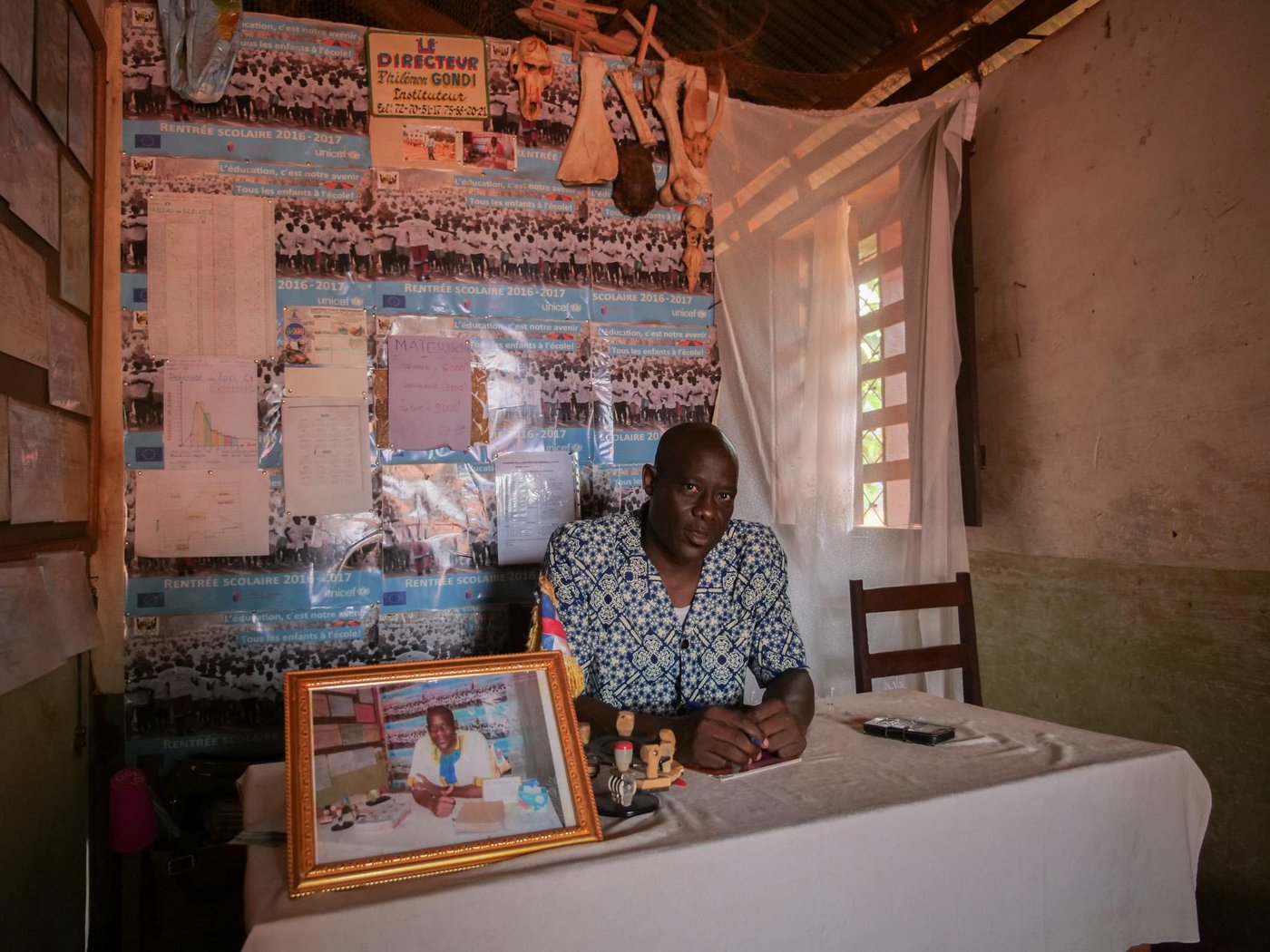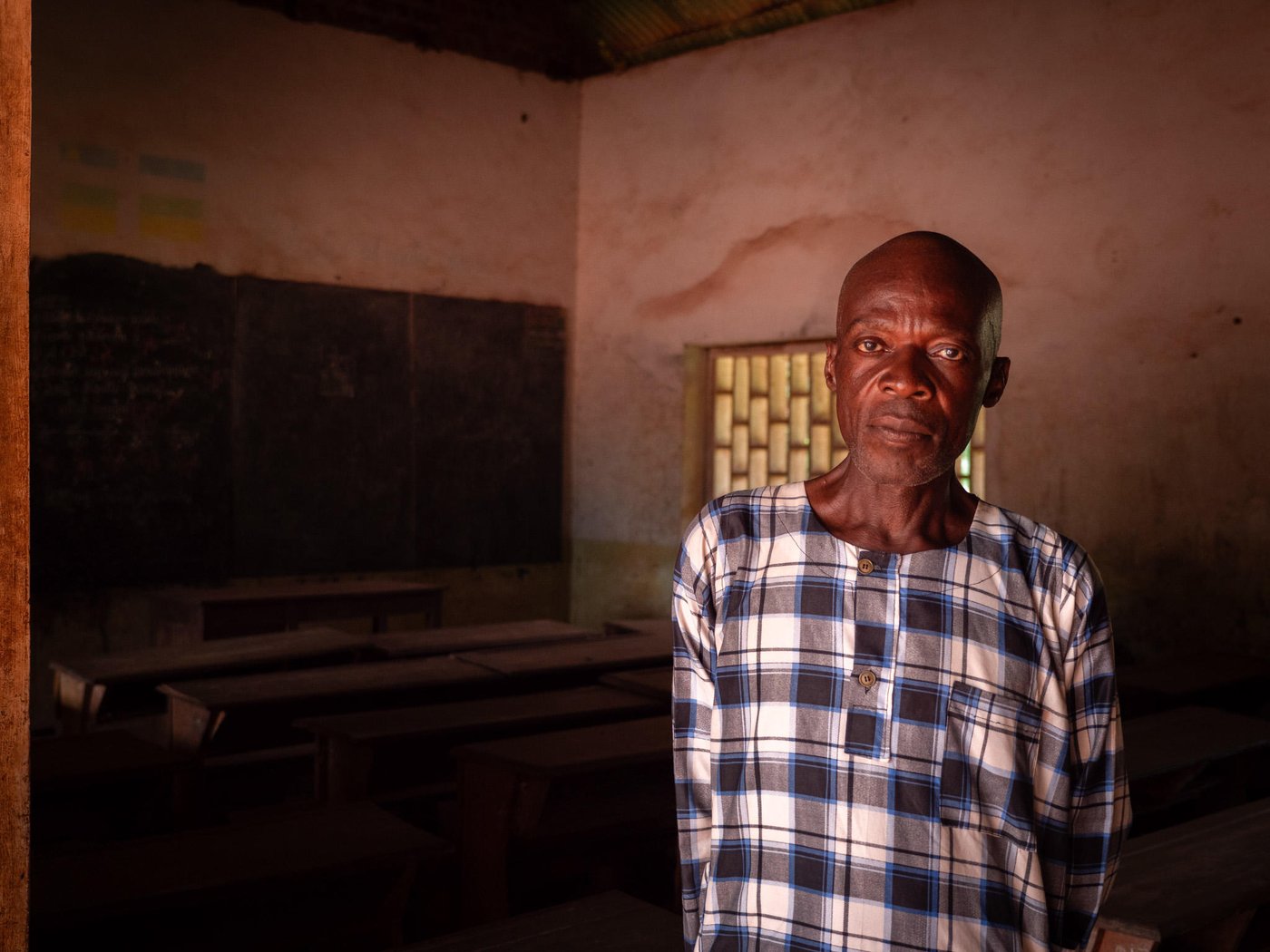Philémon Gondi is the headteacher of a public primary school for girls in Berbérati, in the Mambéré-Kadéi prefecture. The town is the country's third largest urban centre, but the education system is in crisis.
“In our school, we have more than 1,000 pupils enrolled,” says Philémon. “We only have two permanent teachers, including myself, and four community teachers. That's more than 150 children per teacher.”
This lack of teachers is not unusual in CAR. In the most remote areas of the country, there is an average of 300 pupils per teacher in the public sector.
Teachers who have been trained in Bangui tend to settle near the capital, where insecurity is less prevalent.
Berbérati, where Philémon is based, is not accessible by tarmac road, making it difficult for teachers to access. Teachers are eligible for flights coordinated by the UN Peacekeeping Mission (MINUSCA), but seats are limited. Once there, services are in short supply.
“There's only one bank here. How can teachers get their salaries?”, asks the headteacher.
Low incomes are an additional constraint for teachers. “I can't afford to pay rent in the town centre, so I walk 6 km out in the morning and 6 km back in the evening to get to the school.”
Philémon is forced to adapt to the circumstances. “We adapt timetables. The children only have one or two hours of teaching a day. With more than 100 pupils per class, we can't really talk about education anymore. We're talking about babysitting.
“The impact on academic achievement is terrible. Some are refused access to secondary school because their level is not good enough.”
Sign up to our newsletter to read more stories from around the world
Addressing the shortage
Insecurity, which has been chronic since the start of the crisis in 2012, is having a heavy impact on CAR's education system. But the shortage of qualified teachers, particularly in primary education, is a long-standing phenomenon that is compromising children’s access to quality education.
To make up for the lack of permanent teachers in the public sector, a system of maîtres-parents (parents who are working as teachers) has been developed. These are parents who are paid by the community or by humanitarian organisations to teach children. They step up to prevent schools from closing and children from dropping out.
In CAR, 81 per cent of teachers are maîtres-parents. This figure is unprecedented.
Lambert Kegde has been a maître-parent for thirty years. The father, who has a degree in German-speaking studies, worked for a long time with German companies. But the crisis, which began in 2012, put an end to his collaborations. Since then, he has been stepping in and working as a teacher in Berbérati for almost no pay.
“Each parent is supposed to contribute 100 XAF (USD 0.15) per child, per month, for our remuneration. At the start of the year, we get around 15,000 XAF (USD 23). But after a few weeks, the parents stop paying and we get nothing,” says Lambert.
“I have a field that brings in a small income. So, I continue to be a community teacher despite everything. I am thinking of our country's children. Passing on knowledge is the most crucial thing,” he concludes.
An education crisis
Without sufficient income, many maîtres-parents give up after a few months. Last year, Philémon Gondi found himself on his own, with just one other permanent teacher, having to teach over a thousand pupils.

“Parents don't always have the means to pay for school, even if the sum seems tiny,” says the headteacher. “Some of them also don't see the point of educating their children in such conditions.”
In CAR, 3.4 million people, over half the population, need humanitarian assistance. At the start of 2023, 44 per cent of school-aged children were out of school. A quarter of all schools were closed or inaccessible in 2022.
The lack of qualified teachers is having a negative impact on academic performance. The number of children attending school falls considerably between primary and secondary school. While over 1.2 million children attend primary school, only 170,000 reach secondary school. And of these, only 6 in 100 pupils graduate from secondary school.
Geographical and social inequalities are glaring. Children aged between 6 and 18 living in urban centres are four times more likely to have reading skills than children living in rural areas. Out-of-school children are also exposed to protection risks, such as child labour and early pregnancy.
The Norwegian Refugee Council (NRC) works with 148 schools across the country with a total of 60,675 pupils. We have trained 415 parents to become maîtres-parents in the formal education system.
“If we don't tackle the root causes of the education crisis in CAR, most of the country will be illiterate within 20 years,” warns Clemence Sebusanza, NRC’s Education Project Manager.
***
This year, the education sector has received less than half the funding needed. The World Bank estimates that the external funding gap to CAR’s education system for 2025-2029 is USD 95 million. Both humanitarian and development donors need to step up funding and coordination to ensure we can improve access to quality education to children as well as better support and integrate maîtres-parents into the formal system.
Sign up to our newsletter to read more stories from around the world


